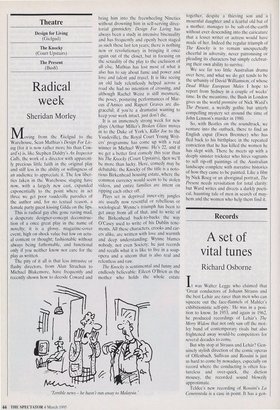Theatre
Design for Living (Gielgud) The Knocky (Court Upstairs) The Present (Bush)
Radical week
Sheridan Morley
Moving from the Gielgud to the Warehouse, Sean Mathias's Design For Liv- ing (for it is now rather more his than Cow- ard's) is, like Stephen Daldry's An Inspector Calls, the work of a director with apparent- ly precious little faith in the original play and still less in the ability or willingness of an audience to appreciate it. The few liber- ties taken in the Warehouse staging have now, with a largely new cast, expanded exponentially to the point where in act three we get poor vaudeville parodies of the author and, for no textual reason, a female party guest kissing Gilda on the lips.
This is radical gay chic gone raving mad, a desperate designer-concept deconstruc- tion of a once great play in the name of novelty; it is a glossy, magazine-cover event, high on shock value but low on actu- al content or thought; fashionable without always being fathomable, and functional only if you neither know nor care for the play as written.
The pity of it all is that less intrusive or flashy directors, from Alan Strachan to Michael Blakemore, have frequently and recently shown how to decode Coward and
bring him into the freewheeling Nineties without drowning him in self-serving direc- torial gimmickry. Design For Living has always been a study in intensive bisexuality and has frequently and openly been staged as such these last ten years; there is nothing new or revolutionary in bringing it once again out of the closet, but in focusing on the sexuality of the play to the exclusion of all else, Mathias has lost most of what it also has to say about fame and power and love and talent and travel. It is like seeing an old lady relentlessly helped across a road she had no intention of crossing, and although Rachel Weisz is still mesmeric, the posey, posturing performances of Mar- cus d'Amico and Rupert Graves are dis- graceful; if you're a dramatist wanting to keep your work intact, just don't die.
It is an immensely strong week for new plays (Arthur Miller's Broken Glass moves in to the Duke of York's, Killer Joe to the Vaudeville), the Royal Court Young Writ- ers' programme has come up with a real winner in Michael Wynne. He's 22, and if we get a better first comedy this year than his The Knocky (Court Upstairs), ten we'll he more than lucky. Here, comedy may be debatable: the Knocky of the title is a noto- rious Birkenhead housing estate, where the common currency would seem to be stolen videos, and entire families are intent on ripping each other off.
Plays set in deprived inner-city jungles are usually now resentful or rebellious or sociological: Wynne's triumph has been to get away from all of that, and to write of the Birkenhead back-to-backs the way O'Casey used to write of his Dublin tene- ments. All these characters, crooks and car- ers alike, are written with love and warmth and deep understanding: Wynne blames nobody, not even Society; he just records and recalls what it is like to live in a soap- opera and a sitcom that is also real and relentless and raw.
The Knocky is sentimental and funny and endlessly believable: Eileen O'Brien as the mother who holds the whole estate Ten-ible news — he hasn't run away to Malaysia.' together, despite a thieving son and a mournful daughter and a fearful old hat of a mother, manages to be salt-of-the-earth without ever descending into the caricature that a lesser writer or actress would have made of her. Indeed the regular triumph of The Knocky is to remain unexpectedly cheerful in adversity, never patronising or pleading its characters but simply celebrat- ing their own ability to survive.
We see far too little Australian drama over here, and what we do get tends to he the urbanity of David Williamson, of whose Dead White European Males I hope to report from Sydney in a couple of weeks' time. In the meantime, the Bush in London gives us the world premiere of Nick Ward's The Present, a weirdly gothic but utterly compelling mystery set around the time of John Lennon's murder in 1980.
So, with Beatles on the soundtrack, we venture into the outback, there to find an English expat (Ewen Bremner) who has fled back to his birthplace in the repeated conviction that he has killed the women he has slept with. There he meets up with a deeply sinister trickster who hires vagrants to sell rip-off paintings of the Australian landscape complete with narrative histories of how they came to be painted. Like a film by Nick Roeg or an aboriginal portrait, The Present needs revisitation for total clarity: but Ward writes and directs a darkly poeti- cal, haunting tale of men in search of may- hem and the women who help them find it.


























































 Previous page
Previous page